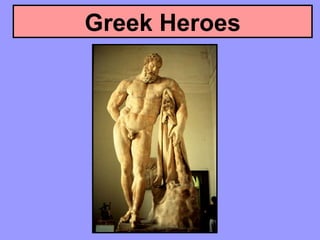
Heroes
- 1. Greek Heroes
- 2. The Ideal Greek Hero We use the term hero very broadly. For us a hero is someone who stands out from others, someone distinguished by prominence, bravery, or merit. For the Greeks however, the term hero had a much more specific meaning. The hero might be a king or he might be a warrior; he was always a nobleman. The prestige of the hero often depended upon his achievements and the public recognition of these (kudos). War and its associated actions were an ideal opportunity to show the Greek quality of arete (excellence) and the winning of kleos (glory).
- 3. Myth or Legend? In divine myths, the principal characters are gods and goddesses, but in legends, the protagonists are human characters. While gods and goddesses often play a role, legends are chiefly stories about heroes, stories that purport to narrate events from the human past. Both myths and legends tend to be in the context of a “golden age”, a time when men and gods walked side by side.
- 4. Motifs In Heroic Myths The hero’s birth is miraculous or unusual. The hero goes on a long journey. The hero is rewarded with something of great value. The hero is responsible for his best friend’s death. The hero has great strength. The hero falls under the enemy’s power and is compelled to perform impossible labours in order to claim his rightful inheritance. The hero breaks a taboo, and a terrible price is demanded. The hero resists the temptations of an irresistible but dangerous woman.
- 5. Genealogies Cecrops + Aglaurus Erysichthon Aglaurus + Ares Herse + Hermes Pandrosus Alcippe + Eupalamus Procris + Cephalus + Eos Polycaste Daedalus + Slave girl Phaethon Predix Icarus The genealogies of the Greek heroes were important as the Greeks believed that such legendary figures really had existed and members of important families regarded themselves as having descended from them. Alexander the Great, for example, claimed he could trace his ancestry back to Achilles, Heracles and Zeus.
- 6. The Function of Legends Like myth, legends served a specific function in that they explained certain rituals / customs, and often gave an example of how / how not to act. While Greek heroes were often stronger, more intelligent, more beautiful, and more favoured by the gods than the average person, almost all had serious character flaws.
- 7. Perseus Son of Danae and Zeus (Zeus “visited” Danae as a shower of gold). Mother and son banished after an oracle said the son of Danae would kill her father Acrisius. With the help of Athena and Hermes (who gave him a sickle, bag, cap of darkness for invisibility and winged shoes), Perseus killed the Gorgon Medusa, a monster with serpents for hair who turned anyone who looked at her to stone.
- 8. Heracles The greatest of Greek heroes, Heracles was the son of Alcmene and Zeus (Zeus “visited” Alcmene in the form of her husband). Heracles was harassed by Hera for being the illegitimate offspring of Zeus. Most famous for his 12 labours. Upon his death, Heracles was made immortal. Despite being a hero, Heracles had many character flaws, particularly hubris (excessive pride).
- 9. Theseus The son of Aethra and Poseidon. His ‘father’ Aegeus placed sandals and a sword under a rock. When Theseus could lift the rock and retrieve the articles, he would prove he was the rightful king of Athens. Theseus’ major achievement was travelling to Crete and killing the Minotaur (half bull, half man), escaping from the labyrinth using a thread given to him by Ariadne.
- 10. Jason Son of Aeson and Alcimede . Brought up by the Centaur Chiron in Thessaly. Most famous for being the leader of the Argonauts in their quest for the golden fleece. Jason is sent on the expedition by his Uncle who has taken over the throne which is rightfully Jason’s. Jason is aided by Aphrodite and Hera and Pelias’ (owner of the fleece) daughter Medea. He later abandons Medea who kills their children and new wife (subject of Euripides’ Medea).
- 11. Oedipus Son of Laius and Jocasta, who kills his father and marries his mother thus fulfilling a prophecy given before his birth. Also famous for ridding the city of Thebes of the man-eating Sphinx by solving its riddle. Oedipus blinds himself when he discovers the truth by stabbing himself in the eyes with Jocasta’s combs. Oedipus was a favourite subject for many Greek playwrights. Sophocles wrote ‘King Oedipus’, ‘Oedipus at Colonus’, and ‘Antigone’, while Euripides wrote ‘Oedipus’.
- 12. Achilles Son of Peleus (a mortal) and Thetis (a sea nymph). Achilles is the ultimate Homeric hero, carrying the savage ethical code of revenge to its terrifying conclusion in the Illiad. To make him immortal, Thetis held Achilles over a fire to burn away his mortality. His only ‘weakness’ was the heel by which she holds him. Achilles is eventually killed by Paris and Apollo, thus fulfilling the prophecy that he would die if he went to Troy.